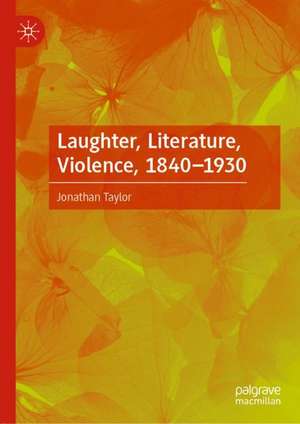Laughter, Literature, Violence, 1840–1930
Autor Jonathan Tayloren Limba Engleză Hardback – 22 feb 2019
Preț: 529.45 lei
Preț vechi: 622.88 lei
-15% Nou
Puncte Express: 794
Preț estimativ în valută:
101.34€ • 110.12$ • 85.18£
101.34€ • 110.12$ • 85.18£
Carte tipărită la comandă
Livrare economică 21 aprilie-05 mai
Preluare comenzi: 021 569.72.76
Specificații
ISBN-13: 9783030114121
ISBN-10: 3030114120
Pagini: 307
Ilustrații: X, 258 p. 1 illus.
Dimensiuni: 148 x 210 mm
Greutate: 0.47 kg
Ediția:1st ed. 2019
Editura: Springer International Publishing
Colecția Palgrave Macmillan
Locul publicării:Cham, Switzerland
ISBN-10: 3030114120
Pagini: 307
Ilustrații: X, 258 p. 1 illus.
Dimensiuni: 148 x 210 mm
Greutate: 0.47 kg
Ediția:1st ed. 2019
Editura: Springer International Publishing
Colecția Palgrave Macmillan
Locul publicării:Cham, Switzerland
Cuprins
1. Preface: Allegories of Laughter. I. Comedy and Hybridity. II. Laughter and Annihilation.- 2. His ‘Last Jest’: On Laughter, Edgar Allan Poe and ‘Hop-Frog’. I. Comedy and Horror. II. Laughter and Democracy. III. Laughter and Leap-Frog.- 3. ‘Unseemly Levity’: On Memoirs, Humour and Edmund Gosse. I. Humour and Genre. II. Humour and Emotion. III. Humour and Text. IV. Humour and Beyond.- 4. ‘Perfect Laughter’: On War, Wyndham Lewis and The Wild Body. I. Laughter and Dualism. II. Laughter, Dualism and Bodies. III. Laughter, Dualism, Bodies and Anarchism.- 5. Epilogue: ‘Derisive Laughter’: On Superiority, Katherine Mansfield and ‘Miss Brill’.
Recenzii
“In Laughter, Literature, Violence, 1840-1930 we see the convoluted relationship between laughter, violence, war, horror and death. … This is a text for the academic to help him or her to interrogate and to investigate and a book for the interested party, who enjoys the subject. Both are well served. It is not too academic to put off the casual reader, yet it has enough gravitas to educate and intrigue.” (Jon Wilkins, Everybody's Reviewing, Everybody's Reviewing, everybodysreviewing.blogspot.com, March 23, 2019)
Notă biografică
Jonathan Taylor is Associate Professor at the University of Leicester, where he directs the MA in Creative Writing. He is an author, editor and lecturer, whose writing encompasses both critical and creative forms. His previous monographs are Mastery and Slavery in Victorian Writing (Palgrave Macmillan, 2003), and Science and Omniscience in Nineteenth-Century Literature (2007). His creative work includes a memoir, Take Me Home (2007), the novel Melissa (2015), and the poetry collection Cassandra Complex (2018).
Textul de pe ultima copertă
"It's all here, everything, everything that has ever made someone laugh: Charlie Chaplin, Monty Python, sex, gas, dreams, ourang-outangs, the English, machines, mud, God, death, war, philosophy. In short: this is all but the last word on laughter – all but the last laugh, someone might say" — Professor John Schad, Lancaster University, UK
"A provocative study of comic effects that are central to the reader's response yet overlooked by literary critics. Taylor's writing is both scholarly and entertaining, as he anatomises the links between laughter, cruelty and violence. His insights into the relationship between the hybridity of laughter and the generic hybridity of short story and memoir will be invaluable to scholars of both of these forms" — Professor Ailsa Cox, Edge Hill University, UK
"Laughter, Literature, Violence, 1840-1930 treats the relationship between laughter and violence, and between conflicting emotions and incongruous feelings. This scholarly captivating study reflects upon the “hybrid” nature of humour by using works penned by American and British writers such as Edgar Allan Poe, Edmund Gosse, Wyndham Lewis and Katherine Mansfield. Deftly moving between philosophy and literature, Jonathan Taylor tackles the ambivalent implications of comedy against the grain of standard approaches to the idea of “amusement”. This book engages with recent scholarship, but – at the same time – offers a different perspective to the relationship between the literary and the humoristic, presenting an extensive treatment of the subject in a period ranging from the nineteenth century to Modernism." — Saverio Tomaiuolo, Associate Professor of English Literature and Language, Cassino University, Italy.
"Laughter, Literature, Violence, 1840-1930 treats the relationship between laughter and violence, and between conflicting emotions and incongruous feelings. This scholarly captivating study reflects upon the “hybrid” nature of humour by using works penned by American and British writers such as Edgar Allan Poe, Edmund Gosse, Wyndham Lewis and Katherine Mansfield. Deftly moving between philosophy and literature, Jonathan Taylor tackles the ambivalent implications of comedy against the grain of standard approaches to the idea of “amusement”. This book engages with recent scholarship, but – at the same time – offers a different perspective to the relationship between the literary and the humoristic, presenting an extensive treatment of the subject in a period ranging from the nineteenth century to Modernism." — Saverio Tomaiuolo, Associate Professor of English Literature and Language, Cassino University, Italy.
Caracteristici
Examines the hybrid nature of humour and comedy in works by Edgar Allan Poe, Gosse, Wyndham Lewis, and Katherine Mansfield Explores the complex nature between laughter and violence Views comedy in relation to other literary modes, forms, genres, sub-genres and generic traits
